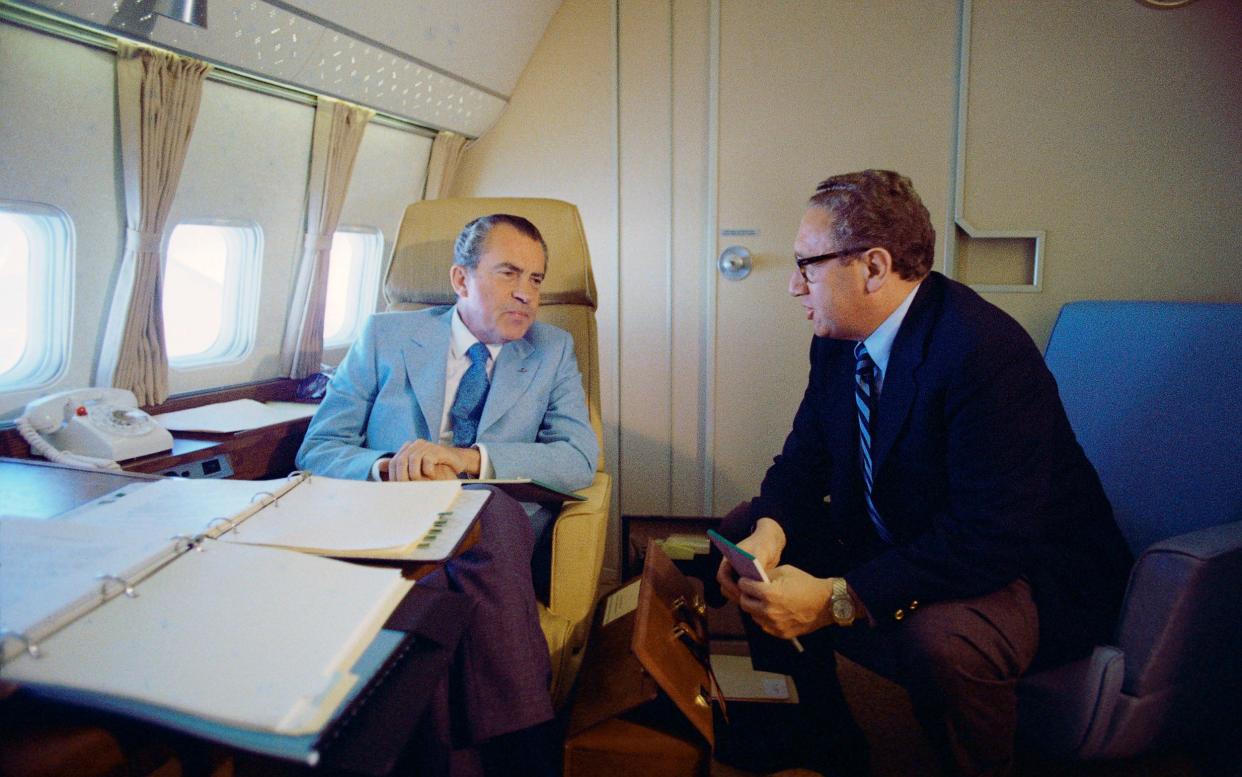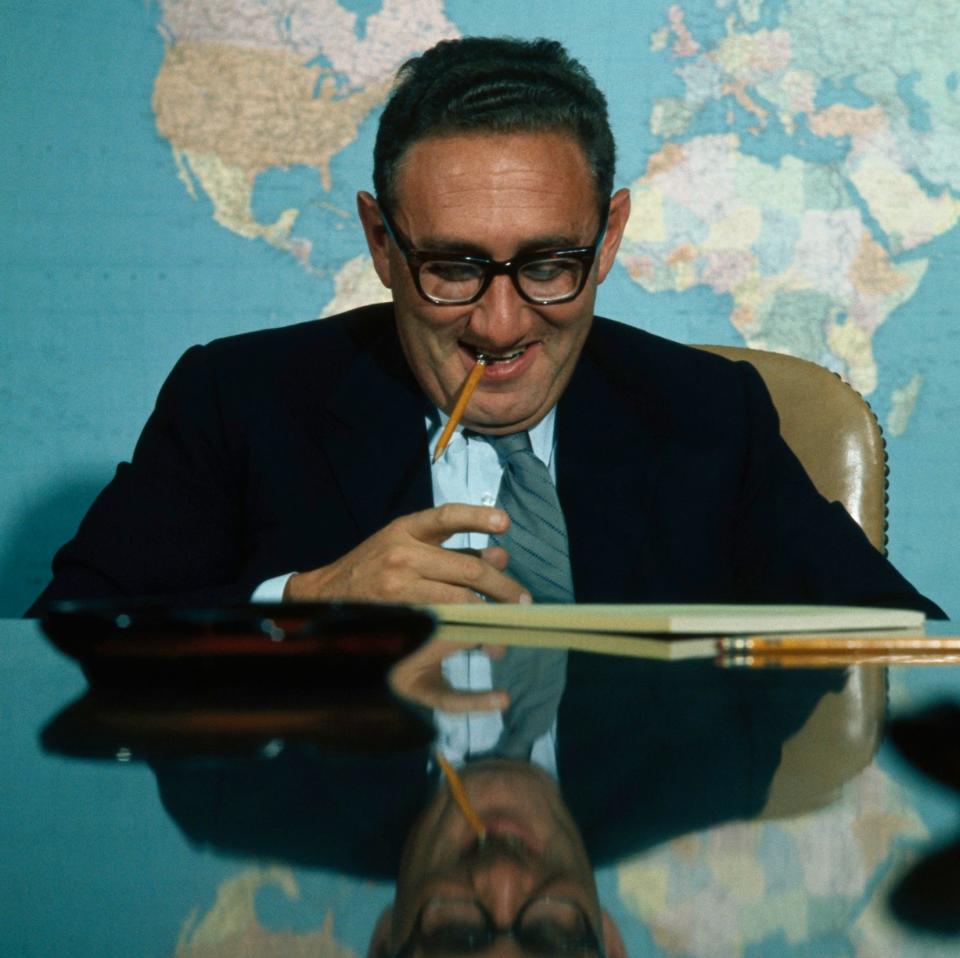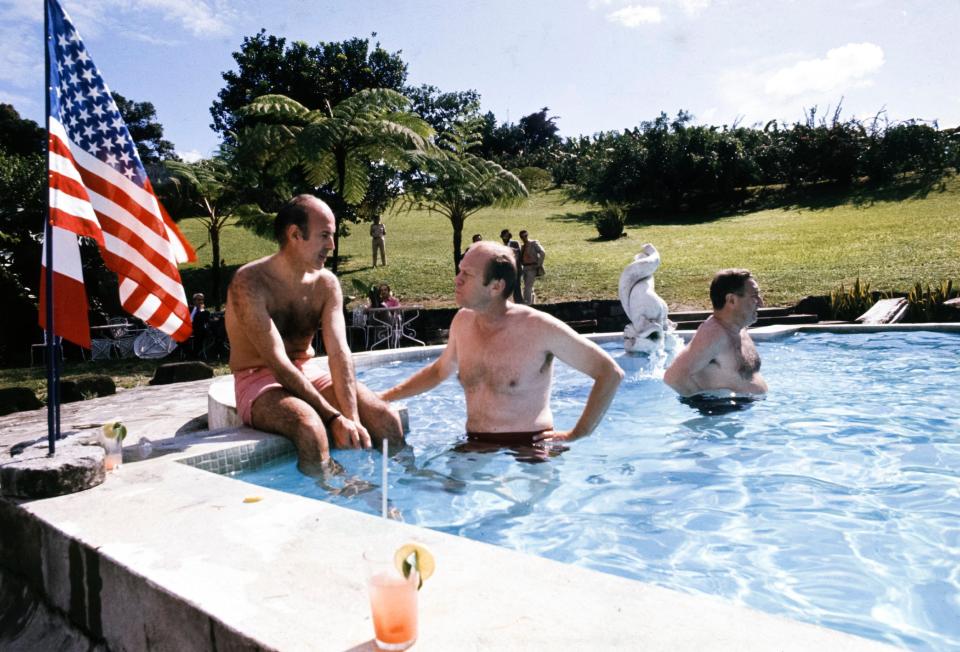Henry Kissinger’s tips for aspiring world leaders – based on his intimate acquaintance with six

- Oops!Something went wrong.Please try again later.
- Oops!Something went wrong.Please try again later.
- Oops!Something went wrong.Please try again later.
Henry Kissinger has just entered his 100th year, and long may he continue. He is one of those indestructible witnesses to history who seem literally to have seen everything and known everyone: a living archive. His inseparability from the mainstream of world history began in the 1930s when his Jewish family were driven out of Germany. He fought for America in the Second World War. By the 1950s he was a professor of history at Harvard. In the early 1960s he was in Kennedy’s White House and by the end of the decade in Nixon’s.
For a while, he was despised by some, mainly on the Left, for his espousal of a foreign policy aimed at securing the maximum power for America in the world. These days, he more generally attracts the sentimental regard of those who think about him, helped by the fact that his perceived errors were committed so very long ago.
With his new book Leadership, he must hope to be able to reignite the Carlylean notion that the history of the world is but the biography of great men: it is not fashionable today, thanks to the effect the concept had in the 20th century, but Kissinger remains convinced that if you get the right man (or woman) in charge, there is no better means of changing a polity’s fortunes. It is ironic that his latest pearls of wisdom should be published just as he has courted controversy by saying that Ukraine should hand territory over to Russia to stop the war there: something that suggests his celebrated judgment is not all it might be. And indeed his new book is an at times unsatisfactory journey through the world of late-20th-century greatness.
Undeniably, it was a greatness with which he was in direct touch. He knew all of his six subjects personally. He first met Konrad Adenauer in the late 1950s, more than a decade after he had begun his towering transformation of a shamed, defeated and partitioned Germany. Kissinger’s association with Charles de Gaulle was more tangential, but he pays his respects to le général’s ability to construct a massive fantasy about wartime and post-war France and, by force of will, make most people believe it.
On Nixon he is, of course, an absolute authority, having served him as National Security Adviser and then as Secretary of State, but here the book suffers from Kissinger’s privileged perspective. With the other great leaders, Kissinger focuses on the reviving effect they have on their own countries; with Nixon, it is as if he were ruler of the entire world. Perhaps, to an extent, he was – or certainly of “the West”. But Kissinger’s account of the fall of his friend and boss is understated, perhaps because to depart in such a fashion, after Watergate and America’s other internal troubles, might suggest that, for all Nixon’s successes in talking to people with whom America had not for some time spoken, notably the Chinese, his leadership was not in the end quite what might be required for inclusion in a book such as this.

So what is Kissinger’s thesis, his lesson to the aspiring statesman? He ends with a quotation from the Stoic Epictetus, that “we cannot choose our internal circumstances, but we can always choose how we respond to them”. He adds that “it is the role of leaders to guide that choice and inspire their people in its execution”. His best example of that dictum is Anwar Sadat, president of Egypt, with whom he was closely involved during the Middle East peace process of the 1970s. Kissinger describes Sadat’s journey from hot-headed terrorist – he grew up detesting the British, who then ruled Egypt, and who imprisoned him in the 1940s – to world statesman, moving from one extreme to another in trying to do what is best for his country, as part of which he even sought to conciliate his most fervent enemy, Israel. Sadat’s risk-taking appeared to have paid off, until members of his own armed forces assassinated him in 1981.
The consequences of risk-taking for his last two subjects, Lee Kuan Yew and Margaret Thatcher, were considerably less brutal. Lee turned Singapore, which faced ruin after Britain closed its great naval base there in the 1960s, into a fabulously successful city state whose GDP per capita is now more than 100 times what it was when he became prime minister in 1965. He achieved this by a strict belief in morality – the first thing he did was root out corruption, so that businesses could be encouraged to trade there, knowing they could trust the system – and by advancing capitalism and free-market solutions. One of these was to encourage a Chinese-speaking people to learn English: it was not done by compulsion, which Lee knew would be counter-productive, but by establishing such good English-speaking educational institutions that his naturally industrious and ambitious people would want to study in them.
To many British readers, the chapter on Thatcher will be familiar, though it is interesting to see her through an American prism, notably during the Falklands War, in which America – clinging to Woodrow Wilson’s doctrine that British imperial power should be diluted and removed wherever possible – was not always entirely helpful. Given that Kissinger says he knew Thatcher for 40 years, the chapter contains remarkably little new insight, and conveys a sense of going through the motions.

Kissinger’s acknowledgements are generous to his editors and researchers, conveying the doubtless accurate impression that the great man supplemented his prodigious memory with vast input from statisticians and a massive fact-checking operation. The book does, perhaps as a result, have the flavour of a comprehensive annual report written in an approved house style by a committee, which makes it distinctly monotone, however authoritative its contents. This has been true of several of Kissinger’s books, and is perhaps the price paid for grandeur, adulation and celebrity: but Gibbon or Macaulay he isn’t.
This book could have been improved in a number of other ways, not least by being shorter. Anyone with an interest in international relations will know much of it anyway, especially if they have read Kissinger’s three memoirs and his other works on foreign policy, or any of the standard works on his subjects. A shorter book that began where the author ends – with that interesting observation from the Stoic – and then showed concisely how and why his subjects, in that spirit, carried out their great acts of leadership would have been more incisive. Still, given the pitiful state of leadership in the western world today, a few of those already in high office would lose nothing except, perhaps, their idiocy by reading it.
Leadership: Six Studies in World Strategy by Henry Kissinger is published by Allen Lane at £25. To order your copy for £19.99, call 0844 871 1514 or visit Telegraph Books

